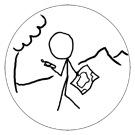| This article relies excessively on references to primary sources. Please improve this article by adding secondary or tertiary sources. Find sources: "Geohashing" – news · newspapers · books · scholar · JSTOR (September 2023) (Learn how and when to remove this message) |
 A geohashing app, converting the day's date and the Dow Jones Industrial Average into a set of coordinates A geohashing app, converting the day's date and the Dow Jones Industrial Average into a set of coordinates | |
| Highest governing body | geohashing wiki |
|---|---|
| Nicknames | Hashing |
| First played | 2008; 17 years ago (2008) |
| Registered players | 800 |
| Characteristics | |
| Contact | No (except where two hashers agree to a local variant) |
| Team members | Varies, usually solo |
| Mixed-sex | Yes |
| Type | Outdoor or indoor, aquatic |
| Equipment | Satellite navigation device or map with latitude/longitude or other grid markings and compass; other equipment may be useful |
| Glossary | glossary |
| Presence | |
| Country or region | Worldwide |
| Olympic | No |
| World Championships | No |
| Paralympic | No |
| World Games | No |
Geohashing /ˈdʒiːoʊˌhæʃɪŋ/ is an outdoor recreational activity inspired by the webcomic xkcd, in which participants have to reach a random location (chosen by a computer algorithm), prove their achievement by taking a picture of a Global Positioning System (GPS) receiver or another mobile device and then tell the story of their trip online. Proof based on non-electronic navigation is also acceptable.
The geohashing community and culture is extremely tongue-in-cheek, supporting any kind of humorous behavior during the practice of geohashing and resulting in a parody of traditional outdoor activities. Navigating to a random point is sometimes done with a goal in mind. Some geohashers document new mapping features they find on the OpenStreetMap project, clean up litter, or create art to commemorate the trip, among other activities.
A variation on geocaching, known as geodashing, features a closely comparable principle, with participants racing between coordinate points.
Invention and spread
 | |
| Sport | geohashing |
|---|---|
| Jurisdiction | worldwide |
| Abbreviation | gh wiki |
| Founded | 2008 (2008) |
| Official website | |
| geohashing | |
| using the wiki is optional to being a geohasher | |
On May 21, 2008, the 426th xkcd comic was published. Titled "Geohashing", it described a way for a computer to create an algorithm that could generate random Global Positioning System (GPS) coordinates each day based on the Dow Jones Industrial Average and the current date. The algorithm was quickly seized by the xkcd community, which used it as intended by xkcd creator Randall Munroe.
Originally a stub where people willing to try the algorithm in real life were to issue their reports, the geohashing official wiki expanded in the following weeks and was a working website as early as June 2008. The current expedition protocol was then established during the following years, with the creation of humorous awards, regional meetups and a hall of amazingness for the various geohasher achievements.
Over time, geohashing gained fame across the internet and now counts more than 15,000 expedition reports. Over a thousand users are registered on the geohashing wiki, though not all are currently active. Geohashing has spread mostly in North America, Europe and Australia, especially around cities.
Geohash

Geohashing divides the earth into a grid made up of graticules which are one degree wide in latitude and longitude. Inside these graticules, a random location is set. Geohashers then have the opportunity to go at the chosen location, either inside their own graticule or in a nearby one. If the location is inaccessible or in a private area, geohashers are advised not to try to reach it, although obviously inaccessible locations have been reached several times. In addition to the repeating location in each graticule, each day there is a single global hashpoint, much more challenging to reach.
See also
- Benchmarking (geolocating) – GamePages displaying short descriptions of redirect targetsPages displaying short descriptions with no spaces
- Degree Confluence Project – Online volunteer photography project
- Letterboxing (hobby) – Outdoor hobby
- Location-based game – Game which reacts to the player's location
- Orienteering – Group of sports that requires navigational skills
References
- Solivellas, Benoit (June 1, 2008). "Geohashing, les rencontres par GPS". CNET France (in French). Retrieved 16 August 2015.
- "Cover stories - Geohashing". geohashing.site.
- "Geohashing". xkcd.
- ^ "Geohashing wiki history - Geohashing". geohashing.site.
- "Hall of amazingness - Geohashing". geohashing.site.
- "Category:Expeditions - Geohashing". geohashing.site.
- "Statistics - Geohashing". geohashing.site.
- "Maps and statistics - Geohashing". geohashing.site.
- "Hall of amazingness - Geohashing". geohashing.site.
External links
| Randall Munroe | |
|---|---|
| Solo works | |
| Related | |